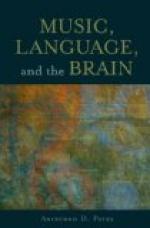All children need experience before they can play to others in such a way that they not only do themselves justice, but give pleasure to their listeners.
Pieces played at such recitals should invariably be by heart. The nervous pupil may possibly break down at her first appearance, but she will be quickly succeeded by a more confident player, the little victim of ‘nerves’ will be soon forgotten, and the experience gained in this way is invaluable.
Before a recital a rehearsal should be held in the same room in which the recital is to take place. Few people seem to realize the immense difference made to children by a change of environment at such a time. The pupil who will play her piece on the piano without one mistake to her mistress, and in the room to which she is used, will often be troubled at playing it on another piano, and in another room.
A child was once known to break down in an evening recital, and when asked the reason, said: ’I have never played that piece before with a candle near me, and I didn’t like the shadows on the piano.’
This sort of remark gives a real insight into the child mind.
Another small point may be mentioned. In the lessons just before a recital the mistress should go to the end of the room in which the lesson is given, while the child is playing her recital piece, in order that her supporting presence near the child may not be missed at the recital.
The recital will probably be followed by some form of reception by the school authorities of the parents of the pupils. No teacher should miss this opportunity of getting to know the parents of her pupils. A friendly talk over the progress, or lack of progress of a child will often result in sympathetic help being given at home, and, in any case, the teacher will probably learn something about the character and home environment of the child which will help her in her work.
Partly owing to lack of time, and partly because some pieces will not be ready, a certain number of children will not be able to play at the school recital. Such children should be gathered together at the end of the term, and should play to the mistress who organizes the work. In this way they too will gain experience, and a little focus will have been made for their work.
We must add one final suggestion. Each music mistress should keep a register, in which she notes not only the names of her pupils, the times of their lessons, absences, late arrivals, &c., but an exact list of all the work done by them, with dates. This is invaluable, not only for gauging their progress, but as a means of quickly ascertaining their work in musical literature. It is, alas! a day of examinations, and with the many little books of studies and pieces which have to be got up for outside examinations there is a serious fear of the systematic education of a child in classical musical literature being interrupted, or, at any rate, put on one side for a time. Such a book makes it possible for the mistress to keep a definite scheme of work in view for each pupil, and the busier the mistress, the more she will need some such aid to her memory.




